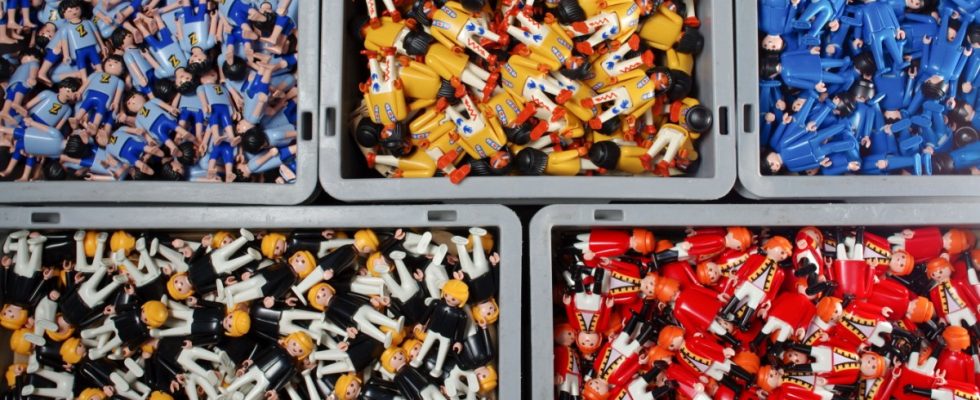The year 2023 will be divided into three parts, at least in Rainer Wiedmann’s perception. From Backnang he controls a small chain of stores with 15 toy stores in Baden-Württemberg. Business was “excellent” until after Easter, he says. The summer was “subdued as expected”. But autumn and, in the worst case, also the Christmas business – there is a risk of a fiasco. How small or large it will be remains to be seen, but one thing can already be said: Business for German toy manufacturers and retailers is worse than it has been for a long time. After the tough Corona years, in which demand was primarily for board and outdoor toys, sales fell by four percent from January to October.
It is expected that 4.5 billion euros will be spent on toys in this country this year, 200 million less than in the previous year and 400 million euros less than in the record year of 2021. The specialist trade association BVS has extrapolated this. “All major manufacturers such as Lego, Mattel, Simba-Dickie, Tonies, Hasbro, Playmobil, Schleich and Kosmos have recorded declining results so far this year,” writes market researcher Circana in a preliminary annual report.
Even Lego, the absolute number one in Germany, with almost 18 percent market share. This has to do with the fact that people are less likely to use the complex Lego kits that cost several hundred euros each. A trend that is being observed in general, says Stimpfle: People are buying less expensive toys than in previous years and are more likely to choose products in the medium or low price range. Last year’s price increase of an average of one percent was hardly significant. Economic uncertainties play a larger role; on average, people have less money in their pockets.
“The crucial weeks still lie ahead of us,” says market researcher Stempfle. Specialist retailers and therefore also manufacturers are hoping for a year-end spurt, and BVS managing director Steffen Kahnt also sees the numerous crises as an opportunity for the industry. “Toy retailers sell dreams and give moments of happiness,” he says. “People are thinking about family and want to at least create a bit of an ideal world for themselves at home.” And in general: “It has always been the case, even in times of crisis, that people save on toys for their children last.” At Christmas 2022, statistically speaking, every child between the ages of three and twelve received toys worth 148 euros.
Manufacturers are similarly ambivalent about the situation. On the one hand, Ulrich Brobeil, Managing Director of the German Association of the Toy Industry (DVSI), speaks of a “robust and resilient industry”. On the other hand, at their annual press conference on Tuesday in Nuremberg, he presented the results of a DVSI survey, according to which only a fifth of German manufacturers expect an increase in sales this year. 57 percent of companies expect significant signs of slowdown in their balance sheets. “The overall situation has worsened,” said Brobeil, and the DVSI members “expect a difficult market environment” for 2024 as well. We are a long way from a crisis or a disaster, but: “There are certainly some business models that are being put to the test, and there is pressure.”
It’s quite possible that Brobeil was thinking of Playmobil and Haba, two of the big German manufacturers that are in serious trouble. Both are cutting staff on a large scale, although for different reasons. Playmobil is cutting 700 jobs worldwide, 370 of them in Germany. There has been unrest in the company for years: employees complain about rude methods in dealing with them, managers come and go. Along with all this, business is going badly.
Some crises are home-made, experts believe
The latter also applies to the wooden toy manufacturer Haba from Bad Rodach in Upper Franconia, which is in self-administration in preliminary insolvency proceedings. Haba has become bogged down in its product range and with too many activities beyond its core business, say industry experts. There are also several hundred jobs available there, and how many of them should actually be announced this Tuesday. That was when the three-month preliminary insolvency proceedings expired, during which a concept for a new start had to be found. Management and employee representatives reportedly negotiated solutions until the very end.
According to experts, the problems at Playmobil and Haba are largely self-inflicted and less influenced by general developments. There are also product categories on the toy market that are currently enjoying high growth. Action figures and toy figures are in vogue at the start of the Christmas business, the animated figures Funko Pop! for example, but also Pokémon or those from the Harry Potter universe. Games and puzzles are still in high demand; Circana puts the increase in sales at ten percent. And the toy classic par excellence, plush toys, are also selling extremely well.
The industry association BVS and a jury from specialist retailers are predicting three further trends for the upcoming Christmas season: Toys with which children can try something out or experiment. Secondly, anything that has to do with animals. There is also a question of what promotes limitless imagination, which also includes the new, opulent Barbie dream house. Speaking of which: The Barbie film was a hit at the box office in 2023, grossing well over a billion euros. Barbie manufacturer Mattel made some money from this – and yet announced sales of $5.4 billion for the current year, at the same level as the previous year. This surprised many fans of the brand and disappointed investors. As a justification for its own caution despite the cinema success, Mattel gave a reason that is often heard these days: “The uncertain economy.”

